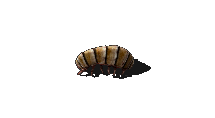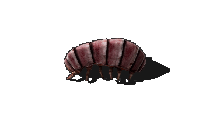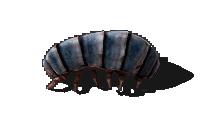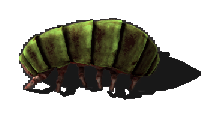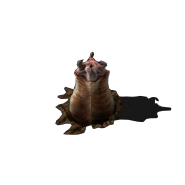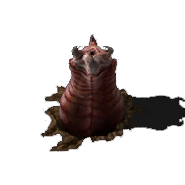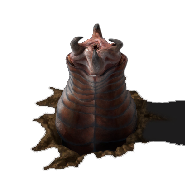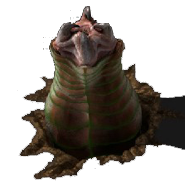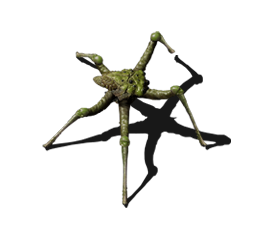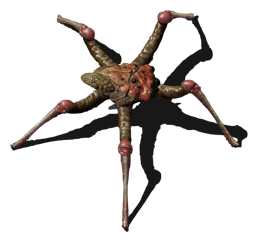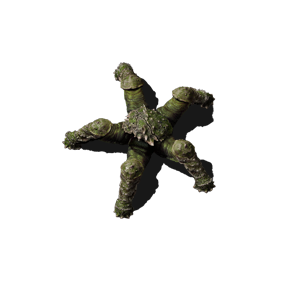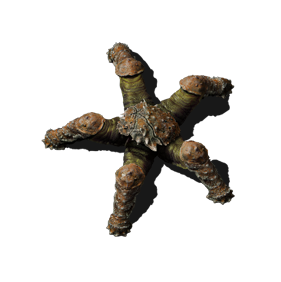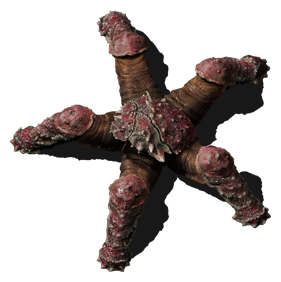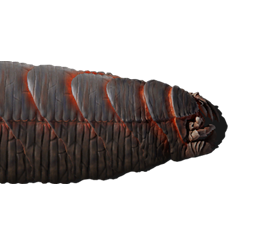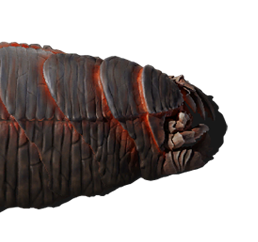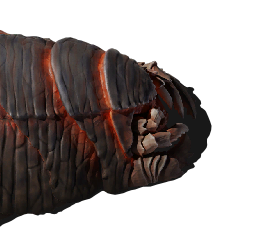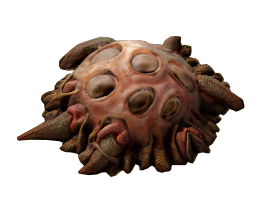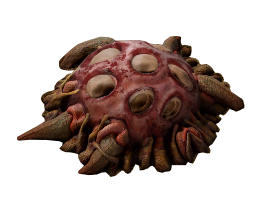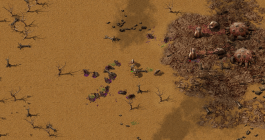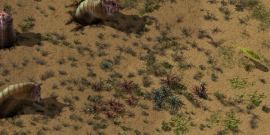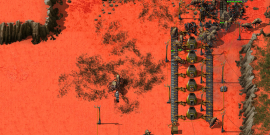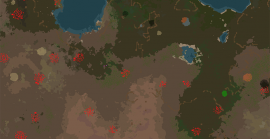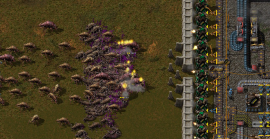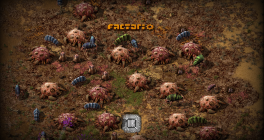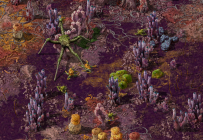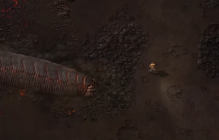Enemies
| This article is a stub, and not comprehensive. |
|---|
| You can help this wiki by expanding it. |
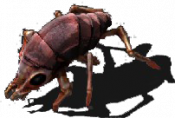
Enemies are creatures that want to harm the player. They are the native inhabitants of the extraterrestrial worlds on which the player is operating. Enemies show up on the map as red dots.
On Nauvis, the enemies are arthropods which live in organic nests. They are encountered in three species: Biters, Spitters, and Worms (though the nickname "Biters" is often used collectively for all of them).
More enemies can be encountered on other planets with the Space Age expansion. On the planet Gleba![]() , there are petapods which come in three varients: Wrigglers, Strafers, and Stompers. On the planet Vulcanus
, there are petapods which come in three varients: Wrigglers, Strafers, and Stompers. On the planet Vulcanus![]() , there are the Demolishers.
, there are the Demolishers.
Each species comes in a range of sizes, where larger specimens have more health and do more damage.
Achievements
Enemies are directly connected to the following achievements:

|
It stinks and they don't like it |

|
Steamrolled Destroy 10 spawners by impact. |

|
Art of siege Destroy an enemy structure using artillery. |

|
Keeping your hands clean Destroy your first enemy structure using artillery. |

|
It stinks and they do like it Attract a group of pentapods using spores. |

|
Get off my lawn Disturb a demolisher by building on its territory. |

|
If it bleeds, we can kill it Kill a small demolisher. |

|
We need bigger guns Kill a medium demolisher. |

|
Size doesn't matter Kill a big demolisher. |
Creatures
Biters
Biters are one of two main antagonists in the base game. They come in four sizes: small, medium, big and behemoth. In the beginning of a game, there will only be the small ones. With increasing pollution, they will become bigger, related to the enemy's evolution. As common sense may suggest, their method of attack is a straightforward charge to "bite" things.
| Picture | Name | Info |
|---|---|---|
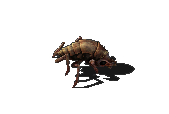 |
Small Biter | Weakest of biters, can be easily killed with a pistol.
|
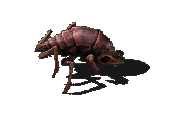 |
Medium Biter | Stronger and slightly faster than the small biter. Can pose a problem for and even kill weaker players.
|
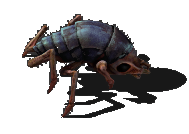 |
Big Biter | Dangerous, resistant to small arms. Can attack through walls, hitting objects directly behind them. Hatches from spoiled biter eggs, however it won't be at full health when this happens.
Resistances:
|
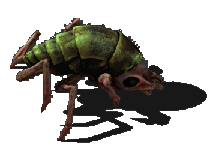 |
Behemoth Biter | Extremely durable and nearly immune to small arms, except for the strongest ordnance. Can attack through walls, hitting objects directly behind them.
Resistances:
|
Spitters
Spitters are much like biters and only appear slightly later on in the game as the evolution factor increases. Their main difference from biters is their ranged attack. Using predictive aiming, they spit a stream of acid at enemies which leaves behind a puddle of acid where it hits the ground. Due to the spitters' predictive aiming, the acid stream can be dodged by suddenly changing walking directions or standing still.[1] Both the stream and the puddle of acid deal damage over time and slow down players and vehicles. Most entities of the game have a much lower resistance to acid than other damage types (including turrets and armor), so spitters are effectively more potent against the player and their factories. Their behavior and size classification are the same as with biters, but their health is universally lower and they are resistant exclusively against explosives, with no physical resistance.
Worms
The Worms are natural allies of biters and spitters and will attack the player if they get close enough with an attack similar to spitters'. They act like static turrets and will not follow attackers. They rely on high damage, great range and splash damage to keep the player away from the worms and the nests they protect, but either one of these advantages can be overcome. Unlike other enemies, they are also highly resistant to fire. They will spit acid at the player, which can also leave acidic puddles on the ground that can still damage players and vehicles, as well as slow them both down and leave a brief acidic, damaging effect for a few seconds. However, placed buildings and tiles are unaffected by the acid puddles, but still take damage normally by the acid projectile.
Worms come in 4 sizes, their power increasing with size. Like biters and spitters, behemoth, big and medium worms spawning is influenced by the evolution factor. Worms are only created during enemy expansion when a certain evolution factor requirement is fulfilled. This is 0.3 for the medium worm, 0.5 for the big worm and 0.9 for the behemoth worm. Below these evolution factors, worms can only be created by the map generation. In map generation, the game restricts higher tier worms behind the distance from the starting point. The further away the player goes from the starting area, the stronger the worms become.
| Picture | Description |
|---|---|
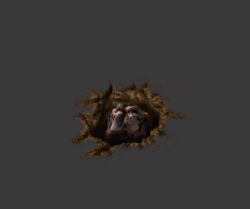 |
A worm's attack animation. |
Wrigglers
Wrigglers are the biter equivalents to the planet Gleba, as they are standard melee enemies. True to their name, they flail and squirm their digits to move around and attack. Much like how biters and spitters spawn from nests, wrigglers spawn from egg rafts. Destroying egg rafts will spawn a group of more premature wrigglers, which are wrigglers that slowly lose health over time until they die. Strafers can launch flying versions of premature wrigglers at their target.
Killing strafers and stompers can summon even more premature wrigglers. The wrigglers that spawn from the corpses of strafers and stompers will match the size of the larger enemy that was killed. For example, killing a small strafer or stomper will spawn small premature wriggers, while killing a medium strafer or stomper will spawn medium premature wrigglers.
| Picture | Name | Info |
|---|---|---|
 |
Small Wriggler | The weakest and smallest of all wrigglers.
Resistances:
|
 |
Medium Wriggler | Slightly stronger and faster than small wrigglers, and can still pose a threat for weaker players.
Resistances:
|
 |
Big Wriggler | The strongest and fastest of all wrigglers. Hatches from spoiled Pentapod eggs but won't be at full health when this happens.
Resistances:
|
Strafers
Native to the planet Gleba, strafers are large yet scrawny five-legged pentapod creatures with the unique behavior of constantly circling around players while attacking them, rather than making a beeline straight for the player, unlike any other type of enemy in the game. They will fire flying premature wrigglers toward the player, essentially adding more enemies to the fight.
Stompers
Native to the planet Gleba, stompers are extremely large, five-legged pentapod creatures with limbs that look similar to a starfish, and seem to have natural, jagged exoskeleton armor that provides high resistances to many types of damage. They are very powerful melee enemies that use their brute force to attack players by simply stomping toward them, while spitting a close-ranged acid that slows down players and Vehicle. Their large size and high damage can destroy buildings instantly. They will spawn premature wrigglers upon death.
Demolishers
Native to the planet Vulcanus, demolishers are horrendously large worm-like creatures that roam across the land and lava. Each individual demolisher patrols a defined territory, and building structures in their territory will disturb them and cause them to attack.
Demolishers have three types of offense. On physical contact they do high damage to the player, and instantly destroy buildings and cliffs. They release a smoke cloud that slows the player and damages any nearby bots. And at range, they cause explosions to erupt from the ground, Due to their high damage resistances and extremely fast health regeneration, killing them requires advanced and upgraded weaponry, or massive quantities of bullets.
Once killed, they leave behind remains similar to that of black volcanic rock, which contain tungsten ore.
Nests
Nests in the wild will have their max health increase with evolution factor exponentially, up to 10 times their starting health.
Biter and spitter nests can be captured by firing a capture bot rocket from a rocket launcher at a nest. After the nest is captured, it must be given bioflux to maintain and continuously create biter eggs. If the nest is not maintained, it will slowly lose 1 health per second, but when fed, it will gain 1 health per second.
Expansions
Every 4-60 minutes, a group of 5-20 biters/spitters will leave their base to create a new base which will consist of as many worms/nests as there are members in the group. This group will search for a suitable spot that's 3-7 chunks away from existing bases. The interval between enemy expansions is global, and the higher enemy evolution, the shorter the interval is on average. Furthermore, with higher evolution, the groups are bigger on average.
Once they have found a suitable spot, each biter/spitter in the group dies and forms a new nest or worm. Forming a new nest or worm will destroy anything that is in the way, which can include members of the expansion group. There is a delay between each member sacrificing itself for to create a worm/nest, so creating the new base from the expansion group can take quite a long time, depending on the group size. Medium worms are only formed if the current evolution is higher than 0.3, big worms only if the current evolution is higher than 0.5 and behemoth worms are only formed if current evolution is higher than 0.9. The game randomly chooses whether to form a new biter nest, spitter nest, small worm, or bigger worm if the evolution factor is high enough. [2]
Expansions on Gleba![]() function mostly similar, except that pentapods only create spawners in marshes, and will never create nests on other tiles.
function mostly similar, except that pentapods only create spawners in marshes, and will never create nests on other tiles.
Defense
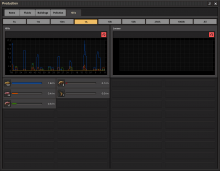
Nests spawn biters and spitters freely. However, biters and spitters will only aggressively engage the player's factory if the pollution cloud of the factory reaches a nest because pollution is consumed to send biters or spitters to join the next attack. Every 1 to 10 minutes (random) the mustered biters launch an attack. If not all biters have arrived at the rendezvous point by that time, they will wait up to an additional 2 minutes for stragglers. The attack then proceeds to their target over the shortest path possible, accounting for terrain, but not for player entities that could pose an obstacle (like walls).
If there is a clear path somewhere around those obstacles, the biters will attempt to go around. If there is no clear passage or a clear passage would mean deviating too far from the original course, the biters will attack whatever is in their way to go through. This can be exploited to an extent; creating mazes at regular intervals along a barrier can direct the biters through a gauntlet not dissimilar to tower defense.
However, if a biter comes in proximity of a military unit or structure, it will prioritize these and attempt to immediately attack them instead, again trying to reach the new target over the shortest possible path with no too great detours, if possible.
Evolution
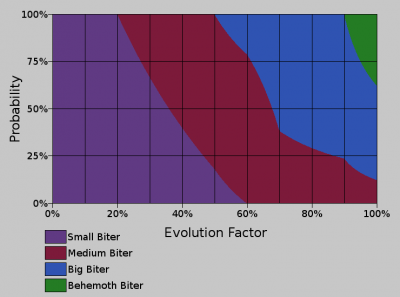
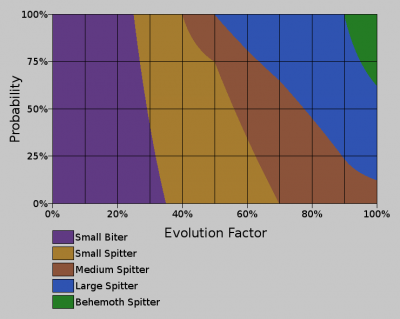
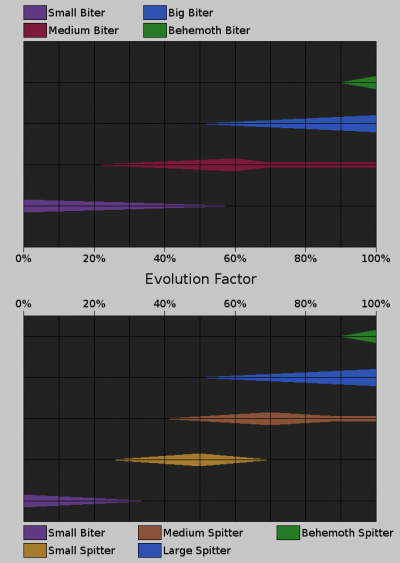
The evolution factor is a global variable that determines what kind of biters will be spawned. You can check the variable in the dev console via the following command (does not disable achievements):
/evolution
The evolution factor goes from 0 (not evolved at all) to 1 (maximal evolution). The evolution factor can only increase.
This command also provides percentages for the three sources; each one is the percent of the (unsquashed) total evolution that is contributed by that source.
Besides choosing what kind of biter will be spawned, the evolution factor also influences the spawning interval. This interval (spawning_cooldown in the enemy-spawner definition) is interpolated between 360 (0 evolution) and 150 (1 evolution) game ticks (= 6 to 2.5 seconds).
Methods of increasing
The evolution factor is increased by three kinds of events:
- The passage of time very slightly increases the evolution factor.
- The global pollution production increases the evolution factor.
- Destroying nests significantly increases the evolution factor.
The default settings are:
| Source per | Variable in enemy_evolution
|
Evolution increase | Pollution equivalent |
|---|---|---|---|
| Second | time_factor |
0.000004 | 267/minute |
| Destroyed enemy spawner | destroy_factor |
0.002 | 2222 |
| 1 Pollution unit | pollution_factor |
0.0000009 | 1 |
Note that all spawners (not worms) generate the same amount of evolution when destroyed.
These values can be set during world generation: the values in the dialog box are multiplied by 10^-7 for time and pollution, and 10^-5 for spawner destruction. In game, they can be found in game.map_settings.enemy_evolution, though checking or modifying them is considered using cheats.
Pollution production is the total pollution produced by buildings, not the pollution spreading on the map, so it is not reduced by trees or other absorbers. e.g. : 10 boilers produce 300 pollution in one minute, raising the evolution factor by around 0.00027 in that minute.
After totaling up all the evolution from these sources, this quantity is squashed to fit in the range [0, 1) by applying evolution_factor = total_evolution / (1 + total_evolution).
Equivalently, marginal increases in evolution are reduced by multiplying the increase by (1 - evolution_factor)². So for instance destroying enemy spawners in the beginning of the game results in increase of evolution factor by 0.002 while doing this when the evolution factor is 0.5 the increase is only 0.0005.
This also means that the evolution factor approaches 1 asymptotically - generally, increases past 0.9 or so are very slow and the number never actually reaches 1.0.
| Evolution factor | Pollution equivalent | Appearance |
|---|---|---|
| 10% | 123k | |
| 20% | 278k | Medium Biter |
| 25% | 370k | Small Spitter |
| 30% | 476k | |
| 40% | 741k | Medium Spitter |
| 50% | 1.111M | Big Biter, Big Spitter |
| 60% | 1.667M | |
| 70% | 2.592M | |
| 80% | 4.444M | |
| 90% | 10M | Behemoth Biter, Behemoth Spitter |
| 95% | 21M | |
| 99% | 110M |
Spawn chances by evolution factor
The probability charts show the chances of each type of biter/spitter for each spawner at all evolution levels.
Advanced: Evolution factor components and computation
This section has charts plotting the individual evolution factor components and discusses possibilities for manually estimating the evolution factor.
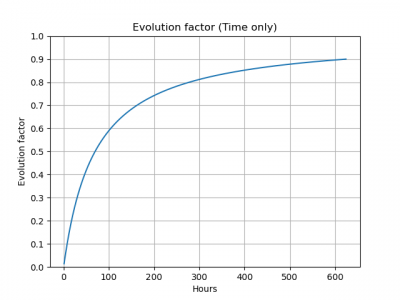
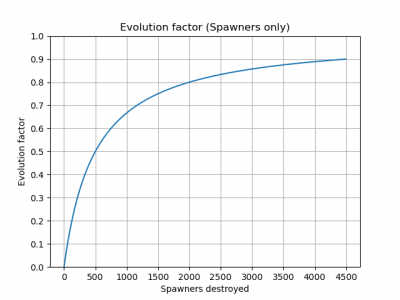
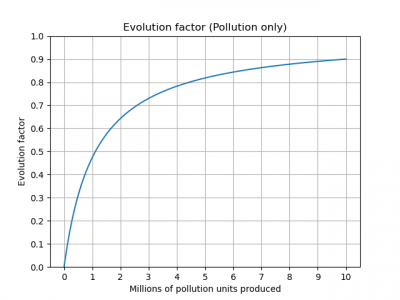
Notes
- Data from version 1.1.50.
- All charts end at approximately an evolution factor of 0.90.
- The calculation steps for time and spawner kills match those used by the game, so these charts should be accurate. The pollution chart assumes a pollution production of 1000 units per second, and due to the recursive nature of the chart values will slightly diverge at different pollution rates. The effect of this is negligible for any reasonable amount pollution production, however.
- Given that the game reports the actual evolution factor (console:
/evolution) whenever the player wishes, these charts are intended primarily to help estimate the impact of planned base expansions and similar activities on the evolution factor's future development.
Comments
These charts (click to enlarge) represent the situation where each evolution factor component (time, pollution, destroyed spawners) is the only component contributing to the evolution factor in that entire game. They are therefore not realistic, as in a typical game all three components will contribute, some at varying times and intensities.
Because of how contributions to the evolution factor (EF) are calculated (multiplied by (1 - current EF)), it is not possible to simply add the values indicated by these charts for a game's time passed, pollution generated, and / or spawners destroyed so far to retrieve the total evolution factor.
For example, if 24 hours have passed (single-component EF =~ 0.25), 200,000 pollution units were released (single-component EF =~ 0.15), and 400 spawners were destroyed (single-component EF =~ 0.45), the actual evolution factor will not be (0.25 + 0.15 + 0.45 =) ~0.85.
However, the evolution factor will always be less than the sum of all individual components as indicated by these charts, and at least as high as the highest individual component. Thus, using the values from above, the EF will be at least 0.35 and less than 0.85. A smarter approach is required to compute the current evolution factor.
Individual components
The individual components of evolution can be approximated from /evolution:
Given the evolution factor, the unsquashed evolution is unsquashed = evolution_factor / (1 - evolution_factor). Multiply this by the percentage for a given component to get its approximate unsquashed contribution. Of course, total pollution and spawner kills can also be found on the production statistics screen, and time passed can be found using the /time command, so it's not fully necessary.
The actual factors can be found in game.forces.enemy.evolution_factor_by_time, ...evolution_factor_by_killing_spawners, and ...evolution_factor_by_pollution, if you don't mind disabling achievements.
Trivia
- Despite their drastically different origins, enemies from different planets will always act as allies against the player. They will even reside around each other's nests when not attacking players, even if the type of nest does not match that of the residing creature. Even demolishers will circle around nests without harming or destroying them. Since enemies only spawn on their respective planets, this is not normally seen in gameplay, unless these creatures are placed near each other in the map editor.
Gallery
-
The player near some enemy nests and worms.
-
The player among acid puddles created by attacking worms.
-
Both the player and some buildings getting attacked by biters.
-
Enemy nests seen in a map generation preview (deathworld setting).
-
Line of gun turrets defending against biters.
-
Enemies seen at the title screen.
-
Pentapod enemies seen on Gleba.
-
A demolisher chases the player on Vulcanus.
History
- 2.0.7:
- Wrigglers, strafers, stompers and demolishers have been added with the Space Age
 expansion.
expansion. - Spawners will have their health increase with evolution (3500 with max evolution).
- Significantly increased medium, big and behemoth worm stats as well as their laser resistances.
- Wrigglers, strafers, stompers and demolishers have been added with the Space Age
- 0.17.0:
- Behemoth worm added.
- 0.15.0:
- Increased the damage, range, and health of worms.
- Decreased health and resist of Behemoth biters.
- 0.13.10:
- Biters and other units won't become aggressive as a result of friendly-fire.
- 0.13.0:
- Big and behemoth enemies now spawn 50% slower.
- Changed the way evolution factor approaches the maximum (1).
- The addition of evolution factor was changed from addition * (1 - evolution) to addition * (1 - evolution)^2
- This means that the progress gets more slower towards the high values.
- 0.12.26:
- Running biters over with a vehicle will now anger them in peaceful mode.
- 0.12.0:
- Updated sounds for enemies.
- 0.11.6:
- Range of spitters is now 15, less than turrets.
- 0.11.0:
- Spitters added.
- Drawing of enemies optimised, so adding new colors does not impact VRAM.
- Blood splashes on death are now procedural.
- 0.9.0:
- Turrets no longer search for enemies when none are near.
- Biters can no longer destroy the shipwreck in the 3rd new hope campaign.
- 0.8.1:
- Further improvement to enemy AI.
- 0.8.0:
- Decreased the range of medium worm from 25 to 20.
- 0.7.2:
- Biter AI improved.
- 0.7.1:
- Peaceful mode added for freeplay.
- 0.7.0:
- Enemy creepers were replaced by small, medium and big biters.
- Enemy turrets were replaced by small, medium and big shooting worms.
- Enemies move and attack in groups.
- Enemies wander around their base when they have nothing to do.
- Enemies call for help when attacked.
- Enemies can create new bases.
- Enemies can now destroy all player creations they find.
- 0.1.0:
- Introduced, called 'creepers'
